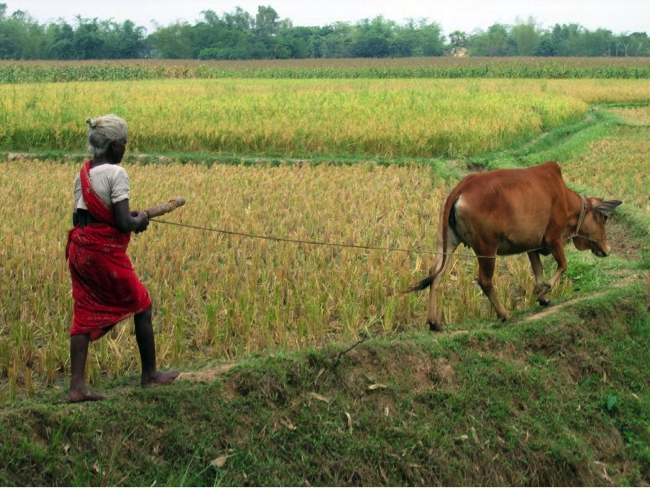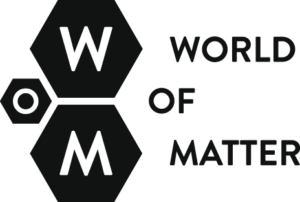Responding to our “Postcolonial Ecologies” panel at September’s “Radical Materialisms” conference held at CUNY Graduate Center, World of Matter author Peter Mörtenböck identified two distinct, but interconnected questions animating our discussion. First: How do we align politically, theoretically, and aesthetically with subalterns defending their lifeworlds and ecologies against the forces of neoliberal globalization? Second: How can we better conceptualize the reciprocities between human and nonhuman agents? These two strands, Mörtenböck continued, while clearly related, are hard to bring together under one political project.
Mörtenböck elucidated the ongoing tension present not only in the canon of works our panel explored under the banner of “Postcolonial Ecologies,” but in the World of Matter project itself. Commentaries written by Helge Mooshammer and Mörtenböck for the World of Matter exhibit call attention to the representational challenges posed by reconciling the “co-operative of things” with our increasingly “demiurgic world,” in which “resources are not conceived of as the object of planning but as planning itself.” Central to these demiurgic, yet transnational circuits of resource extraction is the production of “disposable people.” This is shown, for example, in Uwe H. Martin’s exhibited documentary White Gold: Killing Seeds, which powerfully evokes the farmer suicide epidemic in India’s cotton belt. Since the introduction of genetically-modified Bt cotton in Vidarbha, multinationals like Monsanto have progressively monopolized cottonseed production, in the process driving “expendable” small farmers into deep debt, despair, and, increasingly, suicide. As Diwakar Tapase, a farmer who survived after drinking a canister of pesticides, explains: “They do not kill us, but they don’t let us live.” Interviewed in the film, environmental activist Vandana Shiva goes so far as to characterize the effects of corporate agriculture on Indian farmers as an “economic genocide.”
How, then, should radical ecocritical scholars articulate a posthuman ethics — a turn key to projects like World of Matter that attend to the “political ecology of things”1Bennett, Jane. Vibrant Matter: A Political Ecology of Things. Durham: Duke University Press, 2010. (to use Jane Bennett’s phrase) —in response to the persistence of dehumanization in the exercise of ecological imperialism? Bennett’s “vibrant materialism,” which seeks to undermine subject/object ontologies of human agency, offers a theoretical starting point by demanding that we take seriously the ability of nonhuman matter to resist the demiurgic ambitions of the imperial human gaze. But it is important to also connect the categorical primacy of the human will to mastery over “things” to the dehumanizing instrumentalization of subaltern and indigenous peoples resisting resource imperialism throughout the global South. Provincializing the human within a posthuman political framework thus means attending to the complicity of demiurgic conceptions of human control over “the environment” with necropolitical technologies that mark certain bodies standing in the way of neoliberal development as less-than-human — and therefore disposable.
In beginning to explore this imperative, I would first urge scholars with an ecocritical bent not to see posthumanist work as a requiem for indigenous yearnings for greater sovereignty over their besieged ecologies. Indeed, recent theorizations of land struggles have tended to be pessimistic about indigenous projects to recover dispossessed land. For example, despite providing a useful theoretical model for understanding dispossession politics in postcolonial India, Michael Levien suggests that such struggles represent “ways of mitigating defeat,” rather than viable avenues of resistance.2Levien, Michael. “The Politics of Dispossession: Theorizing India’s ‘Land Wars.’” Politics and Society. Vol. 41, No. 3 (2013), pp. 351-394. This pessimism also exists in other highly sympathetic portrayals of subaltern resistance to resource imperialism, such as Arundhati Roy’s depiction of central Indian Maoist rebels in Walking with the Comrades (2011).3Roy, Arundhati. Walking with the Comrades. New York: Penguin, 2011. To show how the Indian state’s deeply repressive Operation Green Hunt — an oft-denied campaign to weed out Naxalite “insurgents” — brands all indigenous resistance to neoliberal development as “Maoist,” Roy focuses in on the site of struggle: the forests of central India, where the most vulnerable opponents of development are interpellated as a foreign, “terrorist” presence and thus subjected to intense extralegal violence. This is serious enough. However, in portraying the Maoists’ struggle as one of top-down “annihilation,” Roy emphasizes the irreversible ecological consequences of the mining and dam projects the Maoists resist. Because, for example, bauxite mining is highly toxic and permanently alters landscapes, Roy sees the productivity of ecological violence as precluding the recovery of indigenous lands. This reduction of the Maoist struggle to a day-to-day battle “only for survival,” Roy implies, effectively strangles their radical imagination, shifting their agenda from one of visionary social transformation to defending the little land adivasis and other subaltern groups still have access to. The Maoists may have forged “a blueprint for their own survival,” but — at least according to Roy — they do not yet offer any radical alternatives.
At the same time, indigenous projects of land recovery, such as the Landless Workers’ Movement in Brazil (which appears in Frauke Huber and Uwe H. Martin’s LandRush: Frontier Land) and adivasi leader C.K. Janu’s kudil kettu (build huts) (build huts) movement in Kerala, continually defy theoretical pronouncements that their political programs represent impossibilities or overly-romanticized conceptions of indigenous lifeworlds. Janu’s strategy of reclaiming adivasis’ “lost” Kerala forestlands through organized occupation and resettlement, in particular, has won substantial land concessions through demonstrating indigenous knowledge and ecological practices.4Janu, C. K. “We Need to Build Huts All Over Kerala, Again and Again.” Trans. K. C. Bindu. No Alphabet in Sight: New Dalit Writing from South India. Ed. K. Satyanarayana and Susie Tharu. New Delhi: Penguin India, 2011. 431-451.
What Janu enacts is, in effect, an “earth identity”5 based on the rejuvenative powers of adivasi ecological expertise.5Shiva, Vandana. Earth Democracy: Justice, Sustainability and Peace. Cambridge: South End Press, 2008. This identity is not just linked rhetorically to a politics of recovery, but also a practice of recovery that attempts to revive depleted ecosystems using traditional methods. Before the repressive climax of a 2003 occupation of wildlife reserves in Muthanga, which drew police violence unprecedented in “progressive” Kerala, Janu-led adivasis set to work reviving the barren land, with some success. Janu’s strategy, thus, is neither a simple romanticization nor a quixotic response to defeat, but a performance of subaltern efficacy rooted in the condition of being alienated from one’s land and means of sustenance. By disregarding artificial enclosures such as the Muthanga wildlife reserves, the adivasis enact sustainable reciprocities with lived ecologies, challenging the conceptual separation of “human” and “natural” worlds that reifies settler-colonial violence and enables resource imperialism.
For radical scholars and artists wishing to align their work with such struggles, similarly rejecting the subject/object logic of human relationships to the “natural world” may be the starting point for a provincialized humanism. Theoretically recognizing reciprocal sovereignties within an ontologically-diverse “world of matter” points toward an alternative to the anthropocentric demiurge that constructs ecological sovereignty in terms of violent mastery over environments and, consequently, subaltern lifeworlds. This project provides us glimpses of more sustainable worlds to gain—and the tragic stakes of losing these worlds.
Micheal Angelo Rumore is a PhD student in English at the CUNY Graduate Center. His current work focuses on theorizing “world literature” as a critique of globalization. His other research interests include structural adjustment in India, Dalit literatures and critique, postcolonial ecocriticism, and Third Worldism. He teaches courses in composition and postcolonial literatures at Lehman College, CUNY.



